War For The Planet Of The Apes Ending: What It Means, And What Should Happen Next
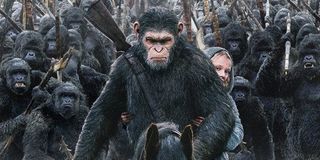
Warning: SPOILERS for War for the Planet of the Apes are ahead!
Recently, War for the Planet of the Apes hit theaters, and it delivered an incredible conclusion to the trilogy that began six years ago. We've watched Caesar grow from an innocent ape who was different from others of his kind to the leader of a revolution that changed the world. During this time we've also watched Earth change into a post-apocalyptic landscape where pockets of humanity are struggling to survive and the intelligent apes are building a new society.
War for the Planet of the Apes not only ended Caesar's story powerfully, but it also paved the way for the next era of Apes movies, if 20th Century Fox decides to continue the series. Before we delve into the seeds planted for the future, let's look at how the movie wrapped up.
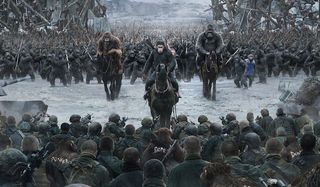
How It Ended
War for the Planet of the Apes kept its promise on delivering an explosive, climactic conflict, but it was during this time that Caesar's fate was sealed. While The Colonel's soldiers were dealing with the rival military forces that arrived to execute him, Caesar and Rocket were able to free the other imprisoned apes. However, rather than join his followers in their escape, Caesar went to kill The Colonel to carry out vengeance for his deceased wife and son, but upon discovering that The Colonel had succumbed to the very infection he was determined to stop from spreading, Caesar decided not to pull the trigger. The Colonel, on the other hand, was all too eager to do the deed, as he would have rather died than become a primitive being.
While leaving The Colonel's complex, Caesar discovered that some of The Colonel's men were gunning down his fellow apes. Grabbing a belt of grenades, Caesar attempted to blow up a nearby fuel container to eliminate those soldiers, but he was by shot by a crossbow before he could do so. Fortunately, Caesar was saved from another arrow when Red, the formerly treacherous gorilla, redeemed himself and obliterated Caesar's would-be killer with his grenade launcher. Red was instantly shot, but his sacrifice allowed Caesar to blow up the fuel container, which subsequently destroyed the rest of Alpha Omega and its facility. After cheering at the demise of their enemies, the opposing military forces then turned their attention to the apes, but before they could take any action, an avalanche buried them all. Caesar, his followers and Nova survived by climbing up the nearby trees and avoiding the avalanche's deadly smothering.
With all the human soldiers from both sides dead, Caesar and his tribe (including Nova and Bad Ape) set out on their original objective: to cross the desert and reach the location that Rocket and Blues Eyes discovered. After many weeks of hard travel, they arrived, and it was immediately clear that this would be a great home for the apes. Unfortunately, the arrow wound that Caesar received at the Alpha Omega facility was worse than it looked, and like Moses, Caesar would not get to live in the Promised Land. As Caesar succumbed to his injury, his longtime friend and adviser, Maurice, promised him that Cornelius would know who his father was and what he stood for. Content with this assurance, Caesar died, and his tribe must now face what's to come without him guiding them.
Now that we've gone over War for the Planet of the Apes' ending, let's look at the seeds the movie planted for the future.
CINEMABLEND NEWSLETTER
Your Daily Blend of Entertainment News
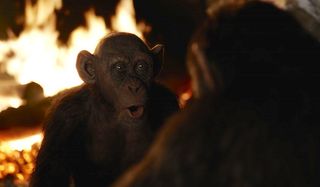
Bad Ape
The super intelligent apes we've followed along with up until War for the Planet of the Apes all either came from the primate sanctuary where Caesar temporarily stayed, Gen-Sys or the San Francisco Zoo. But when the Simian Flu spread across the world and killed most of humanity, other apes became smart as well. That was shown through Bad Ape, who previously lived at the Sierra Zoo. Bad Ape learned to speak English by listening to humans, but because he lived on his own for more than a decade, his eccentric personality was a sharp contrast to the disciplined members of Caesar's tribe. Bad Ape represents the other apes across the United States and elsewhere in the globe who are just as smart as humans, but haven't benefitted from Caesar's leadership. Even though Caesar's followers have found a new home, they may want to keep exploring the U.S., and when they do, they'll likely run into other apes who've been surviving on their own. However, just like it is with humans, there's no guarantee that these apes will get along, and there may come a time when Caesar's tribe will have to wage war with a different ape tribe.
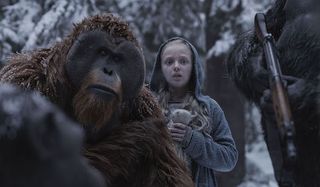
The Devolving Humans
The Simian Flu killed off most of humanity, and unfortunately, those who survived must now deal the virus' mutation, which renders humans mute and devolving them into primitives. Nova was the best example of this; she wasn't able to speak, although her intelligence didn't appear to be affected, as she quickly learned sign language to communicate with Maurice. Nevertheless, these side effects are spreading, and if we look at the original Planet of the Apes movie as the endgame, then eventually all of humanity's descendants will turn into primitives, much like apes were before Gen-Sys inadvertently changed everythig. For the apes to rise and become the superior species, humanity needed to fall and become simple beasts.
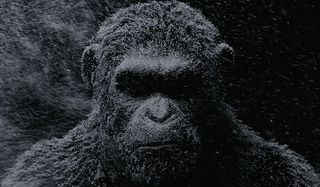
The Franchise's Future
Caesar's arc is complete, but that doesn't mean the Planet of the Apes reboot series has to end. Both Matt Reeves and Andy Serkis have expressed interest in seeing the franchise continue, and a fourth movie has been in development since last fall. So where can we go from here? Well, one option is to jump forward a decade or two and follow along with Caesar's son, Cornelius. If that happens, it would be excellent if Andy Serkis could play him, too, serving as an homage to Roddy McDowall, who played both Cornelius and Caesar in the original Planet of the Apes movies. We could watch the adult Cornelius try to live up to his father's legacy as he defends his people from a rival ape colony (let's skip another conflict with humans).
However, if the fourth Planet of the Apes reboot movie is looking to distinguish itself from its predecessors, the best course of action would be to jump forward even further in time, i.e. a couple centuries or even a millennium, where Caesar is now revered as a legend and possibly even worshipped. That would give audiences apes closer to the ones seen in the original Planet of the Apes, i.e. wearing clothes, living in buildings, maintaining a government, etc. It's also worth noting that while Caesar's tribe is now living in the closest thing they have to paradise, it's unclear exactly where their new home is located. If it is somewhere in the Midwest, since the apes in the original Planet of the Apes lived on the East Coast, perhaps the fourth movie could show the society that descended from Caesar's tribe being forced to leave and find a new home, eventually establishing the classic Ape City and paving the way for the legend of the Forbidden Zone(s).
Finally, there's always the possibility that somewhere down the line, Planet of the Apes will be remade. Tim Burton tried doing that in 2001 and it didn't go well, but the advantage this series has is that it wouldn't be a direct remake, as the history of the apes seizing the Earth in this continuity is much different than it was in the previous series. Let's also not forget that in Rise of the Planet of the Apes, news reports showed that the Icarus spaceship was launched and soon disappeared, so George Taylor and his crew are primed to accidentally travel to the future and discover an Earth more alien than it is familiar. Most importantly, though, is that because audiences have watched Earth become a planet of apes over the past three movies, they'll arguably more emotionally invested in seeing a different kind of Planet of the Apes adaptation. We've watched how one civilization fell and another one rose just over a decade, and now we can see how things have changed thousands of years later.

Connoisseur of Marvel, DC, Star Wars, John Wick, MonsterVerse and Doctor Who lore, Adam is a Senior Content Producer at CinemaBlend. He started working for the site back in late 2014 writing exclusively comic book movie and TV-related articles, and along with branching out into other genres, he also made the jump to editing. Along with his writing and editing duties, as well as interviewing creative talent from time to time, he also oversees the assignment of movie-related features. He graduated from the University of Oregon with a degree in Journalism, and he’s been sourced numerous times on Wikipedia. He's aware he looks like Harry Potter and Clark Kent.
Most Popular







